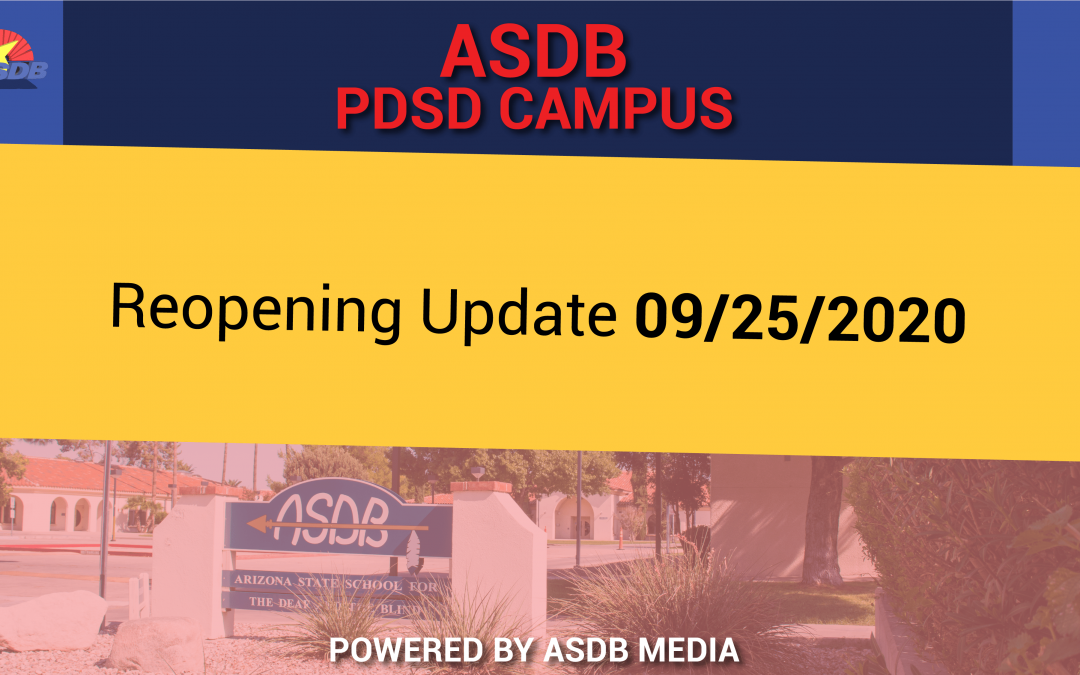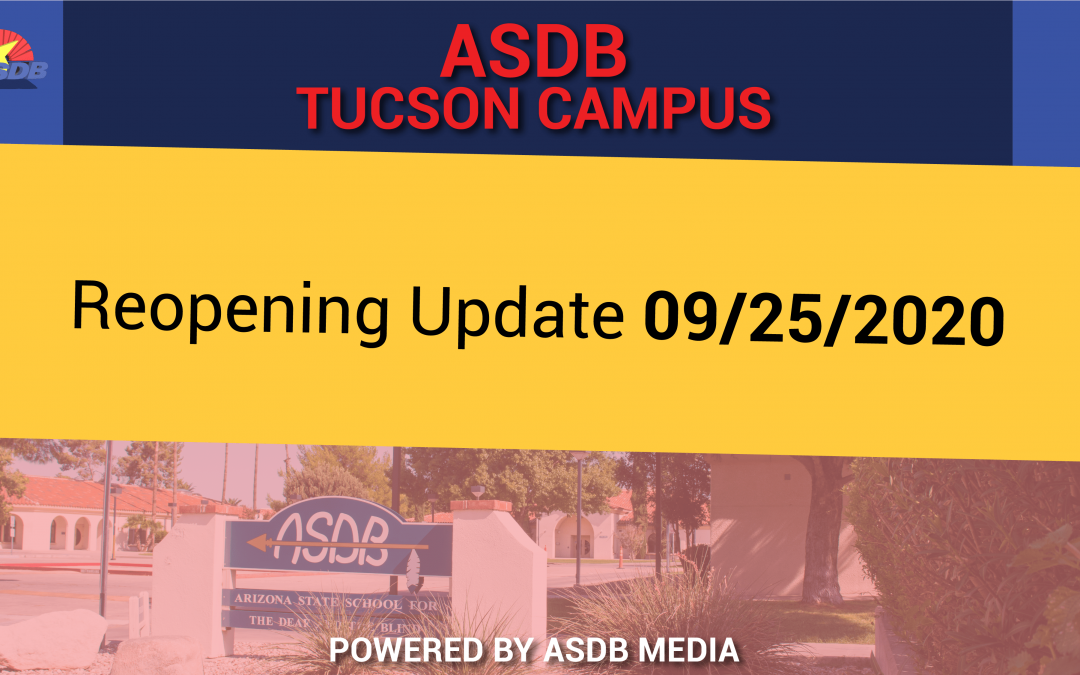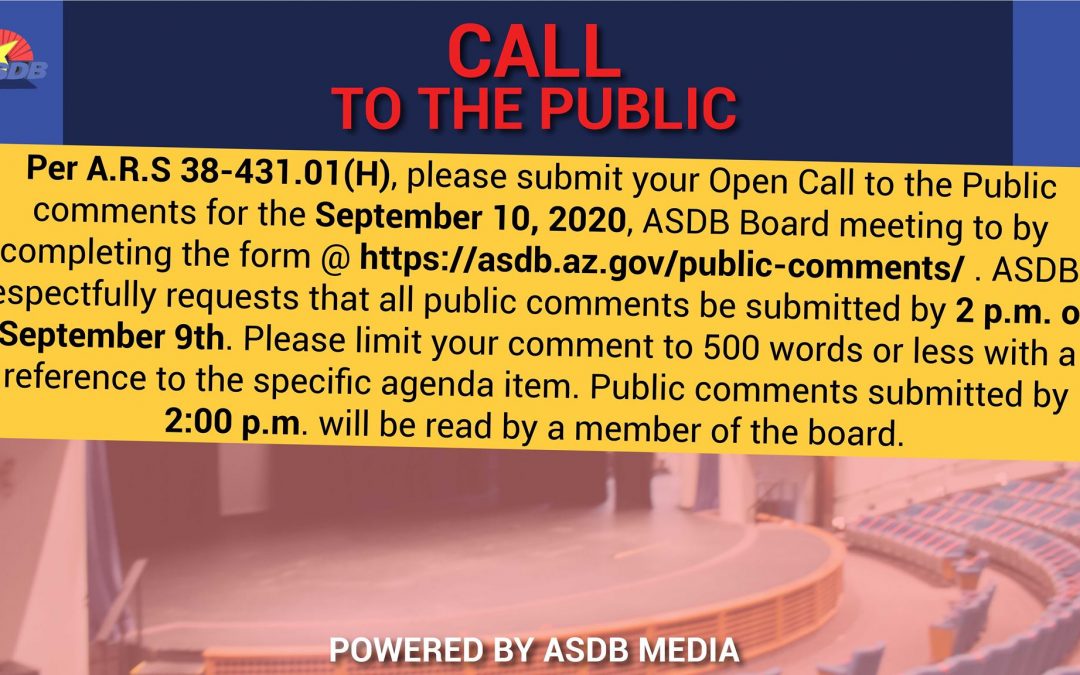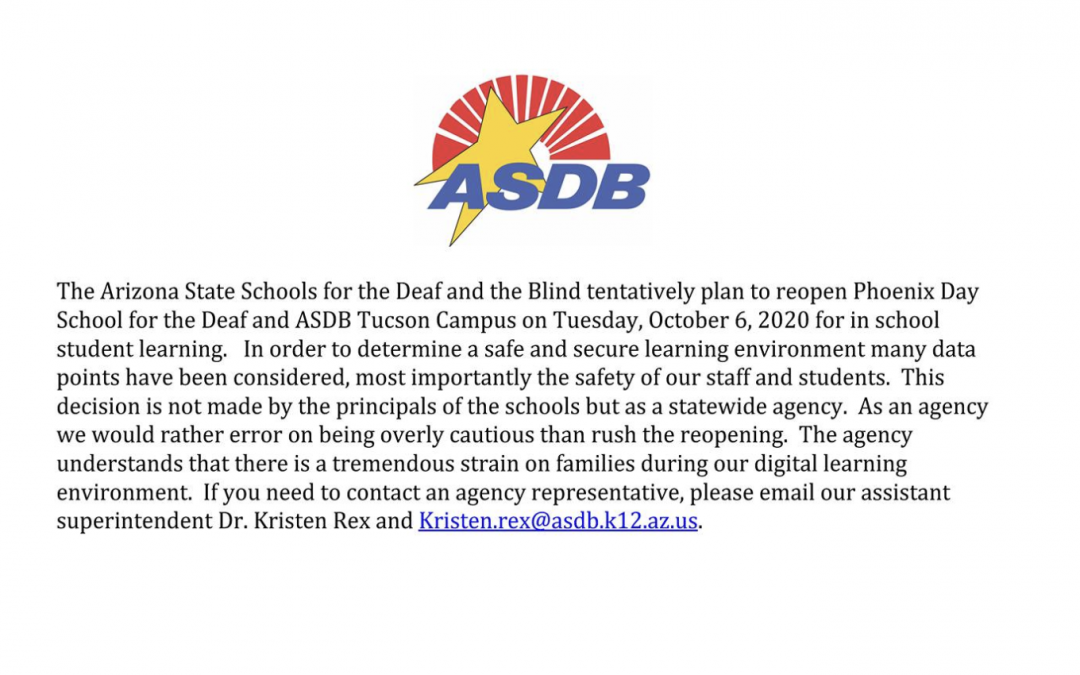
Want to be a part of an amazing team? Send us your Name, Email, and field of interest and we will be in touch!


ARIZONA STATE SCHOOL FOR THE DEAF AND BLIND
OPENING AND OPERATING SCHOOLS DURING COVID-19
2021-2022

We are entering the 2020-2021 flu season in the midst of a pandemic and it is more important than ever to receive a flu vaccine. Here are just a few reasons:
| Who SHOULD get the flu vaccine? |
| Anyone over the age of 6 months should receive a flu vaccine including: – Pregnant women – Older adults over 65 years of age should consider getting the “High Dose” version of the vaccine, talk to your provider for more information – Individuals with chronic medical conditions – Health care workers and their families |
| Who should talk to their healthcare provider BEFORE getting the flu vaccine? |
| – Children younger than 6 months old – Individuals with a severe chicken egg allergy (those with mild chicken egg allergies should check with their physician), there may be an alternative vaccine for those who have an allergy – Individuals who have had a severe reaction to the flu vaccine in the past – Those with a current illness accompanied by a fever should wait until the fever and other symptoms subside to get a flu vaccine |
| Where can I get a flu shot? |
| To locate a flu shot clinic near you: – Contact your primary care provider as they may have vaccines available at their practice – Contact your insurance company to find out if there are any in-network clinic preferences – Visit the “Stop the Spread AZ” website – Dial 211 in Arizona (call 1-877-211-8661 if outside of Arizona) – Call your local pharmacy or grocery store to see if they offer flu shots, you may also visit their websites to find out more information, locations, or to make an appointment |
| When going to receive a flu shot, it is especially important to: |
| – Take COVID-19 safety precautions including: wearing a cloth face covering, maintaining physical distancing, and avoiding crowded, poorly ventilated spaces – Be sure to take your temperature before going to receive a flu shot. If you have a temperature over 100, wait until your fever subsides before getting the vaccine |
| Frequently Asked Question: Can the flu shot give me the flu? |
| Perhaps one of the biggest misconceptions surrounding the flu shot is that getting the vaccine can “give you flu.” In fact, the flu virus is “inactive” which means that the virus particles are dead and thus cannot spread the virus. Some may feel mild symptoms after receiving the vaccine because their body is developing the antibodies needed to protect them from the flu. |
| Visit this link for more information about getting the flu vaccine. |
Information provided by The University of Arizona at: https://azcovidtxt.org/2020/09/01/updates-august-31/
Getting a flu vaccine is more important than ever during 2020-2021 to protect yourself, your family and your community from flu. A flu vaccine this season can also help reduce the burden on our healthcare systems responding to the COVID-19 pandemic and save medical resources for care of COVID-19 patients.
The more people vaccinated; the more people protected. Do your part. Get a flu vaccine this fall.
The Difference between Flu and COVID-19
What You Need to Know for 2020-21 Flu Season
Protect Yourself and Others from COVID-19
Information for Health Care Professionals 2020-2021 Flu Season
Information provided by the CDC : https://www.cdc.gov/flu/season/protect-your-health.html
The single best way to prevent the flu is to get a flu vaccination every year. There are two types of vaccines:
About two weeks after vaccination, antibodies develop that protect against influenza virus infection. Flu vaccines will not protect against flu-like illnesses caused by non-influenza viruses.
Everyone should get vaccinated as soon as the flu vaccine becomes available each year. However, it is still beneficial for anyone who was not vaccinated in early fall to get vaccinated later in the fall or winter because most influenza activity typically occurs in January or later. Though it varies, flu season can last as late as May so it is never too late to get vaccinated.
Everyone 6 months and older should be vaccinated every year. Even healthy people should get vaccinated because they could spread the flu to someone who is at high risk for complications from the flu or who is not able to get a flu vaccine.
Some people should not be vaccinated without first consulting a physician. They include:
If you have questions about whether you should get a flu vaccine, consult your healthcare provider.
Information provided by the Arizona Department of Health Services: https://www.azdhs.gov/preparedness/epidemiology-disease-control/flu/index.php#vaccine
A CDC report released in May 2020 found a troubling drop in routine childhood vaccinations as a result of families staying at home. While families followed public health warnings about going out, an unfortunate result was many missed routine vaccinations. CDC and the American Academy of Pediatrics (AAP) recommend every child continues to receive routine vaccinations during the COVID-19 outbreak.
Children need to be protected against vaccine-preventable diseases. Well-child visits and vaccinations are essential services and help make sure children are protected. Children who are not protected by vaccines may be more likely to get diseases like measles and whooping cough.
As communities are opening up, it’s important for parents to work with their children’s doctor or nurse to make sure their children stay up to date on routine vaccines.
Information provided by the CDC: https://www.cdc.gov/vaccines/parents/visit/vaccination-during-COVID-19.html

CALL TO THE PUBLIC:Per A.R.S 38-431.01(H), please submit your Open Call to the Public comments for the September 10, 2020, ASDB Board meeting by completing the form @ https://asdb.az.gov/public-comments/ . ASDB respectfully requests that all public comments be submitted by 2 p.m. on September 9th. Please limit your comment to 500 words or less with a reference to the specific agenda item. Public comments submitted by 2:00 p.m. on September 9th will be read by a member of the board at the September 10, 2020, ASDB Board meeting.

A message from Superintendent Annette Reichman and Assistant Superintendent Kristen Rex:The Arizona State Schools for the Deaf and the Blind tentatively plan to reopen Phoenix Day School for the Deaf and ASDB Tucson Campus on Tuesday, October 6, 2020, for in-school student learning. In order to determine a safe and secure learning environment, many data points have been considered, most importantly the safety of our staff and students. This decision is not made by the principals of the schools but as a statewide agency. As an agency, we would rather error on being overly cautious than rush the reopening. The agency understands that there is a tremendous strain on families during our digital learning environment.If you need to contact an agency representative, please email our assistant superintendent Dr. Kristen Rex and .
Los Arizona State Schools for the Deaf and the Blind tentativamente planifican reabrir el Phoenix Day School for the Deaf y el recinto escolar ASDB de Tucson el martes 6 de octubre del 2020 para el aprendizaje de los estudiantes en la escuela. Para poder determinar un entorno de aprendizaje seguro y protegido, se han considerado muchos puntos de datos, lo más importante es la seguridad de nuestro personal y estudiantes. Esta decisión no la toman los directores de las escuelas, sino una agencia estatal. Como agencia, preferimos equivocarnos al ser demasiado cautelosos que apresurar la reapertura. La agencia comprende que existe un tremendo estrés sobre las familias durante nuestro entorno de aprendizaje digital. Si necesita comunicarse con un representante de la agencia, envíe un correo electrónico a nuestra superintendente asistente, la Dra. Kristen Rex y .